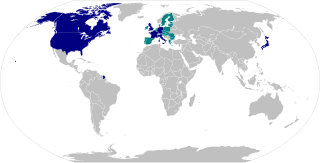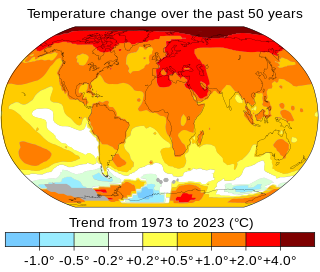Related Research Articles
Globalization, or globalisation, is the process of interaction and integration among people, companies, and governments worldwide. Globalization has accelerated since the 18th century due to advances in transportation and communication technology. This increase in global interactions has caused a growth in international trade and the exchange of ideas and culture. Globalization is primarily an economic process of interaction and integration that is associated with social and cultural aspects. However, disputes and diplomacy are also large parts of the history of globalization, and of modern globalization.

The Group of Eight (G8) was an inter-governmental political forum from 1997 until 2014. It had formed from incorporating the country of Russia into the Group of Seven, or G7, and returned to its previous name after Russia was disinvited in 2014.
2G is short for second-generation cellular network. 2G cellular networks were commercially launched on the GSM standard in Finland by Radiolinja in 1991.

The Group of Seven (G7) is an intergovernmental organization consisting of Canada, France, Germany, Italy, Japan, the United Kingdom and the United States. The heads of government of the member states, as well as the representatives of the European Union, meet at the annual G7 Summit.

The NatureServe conservation status system, maintained and presented by NatureServe in cooperation with the Natural Heritage Network, was developed in the United States in the 1980s by The Nature Conservancy (TNC) as a means for ranking or categorizing the relative imperilment of species of plants, animals, or other organisms, as well as natural ecological communities, on the global, national or subnational levels. These designations are also referred to as NatureServe ranks, NatureServe statuses, or Natural Heritage ranks. While the Nature Conservancy is no longer substantially involved in the maintenance of these ranks, the name TNC ranks is still sometimes encountered for them.

The G20 is an international forum for the governments and central bank governors from 19 countries and the European Union (EU). Founded in 1999 with the aim to discuss policy pertaining to the promotion of international financial stability, the G20 has expanded its agenda since 2008 and heads of government or heads of state, as well as finance ministers, foreign ministers and think tanks, have periodically conferred at summits ever since. It seeks to address issues that go beyond the responsibilities of any one.

Climate change includes both the global warming driven by human emissions of greenhouse gases, and the resulting large-scale shifts in weather patterns. Though there have been previous periods of climatic change, since the mid-20th century, humans have had unprecedented impact on Earth's climate system and caused change on a global scale.
Talis is a genus of moths of the family Crambidae described by Achille Guenée in 1845.

In telecommunications, 5G is the fifth generation technology standard for broadband cellular networks, which cellular phone companies began deploying worldwide in 2019, and is the planned successor to the 4G networks which provide connectivity to most current cellphones. 5G networks are predicted to have more than 1.7 billion subscribers worldwide by 2025, according to the GSM Association. Like its predecessors, 5G networks are cellular networks, in which the service area is divided into small geographical areas called cells. All 5G wireless devices in a cell are connected to the Internet and telephone network by radio waves through a local antenna in the cell. The main advantage of the new networks is that they will have greater bandwidth, giving higher download speeds, eventually up to 10 gigabits per second (Gbit/s). Due to the increased bandwidth, it is expected the networks will not exclusively serve cellphones like existing cellular networks, but also be used as general internet service providers for laptops and desktop computers, competing with existing ISPs such as cable internet, and also will make possible new applications in internet of things (IoT) and machine to machine areas. 4G cellphones are not able to use the new networks, which require 5G enabled wireless devices.

Cymindis is a genus of ground beetle native to the Palearctic, the Near East, and North Africa. It contains the following species:
Elachista povolnyi is a moth of the family Elachistidae. It is found in Austria.
Metallostichodes is a genus of snout moths.
Metallostichodes bicolorella is a species of snout moth. It is found in France and Turkey.
Metallostichodes nigrocyanella is a species of snout moth. It is found in France, Spain, Portugal, Italy, Croatia, Greece and on Cyprus, as well as in Turkey.
Metallostichodes vinaceella is a species of snout moth. It is found in Syria and Turkey.
Cymindis povolnyi is a species of ground beetle in the subfamily Harpalinae. It was described by Jedlicka in 1967.
Mattesia is a genus of parasitic alveolates of the phylum Apicomplexa. Species in this genus infect insects.
Scrobipalpa povolnyi is a moth in the family Gelechiidae. It was described by Emelyanov and Piskunov in 1982. It is found in Mongolia.
Phytoecia povolnyi is a species of beetle in the family Cerambycidae. It was described by Leopold Heyrovský in 1971. It is known from Afghanistan.
References
- ↑ "GlobIZ search". Global Information System on Pyraloidea. Retrieved 2012-02-24.
- ↑ Beccaloni, G.; Scoble, M.; Kitching, I.; Simonsen, T.; Robinson, G.; Pitkin, B.; Hine, A.; Lyal, C., eds. (2003). "Metallostichodes povolnyi". The Global Lepidoptera Names Index . Natural History Museum . Retrieved May 11, 2018.
| This Phycitini-related article is a stub. You can help Wikipedia by expanding it. |